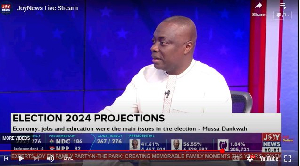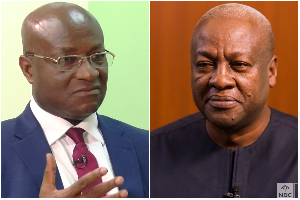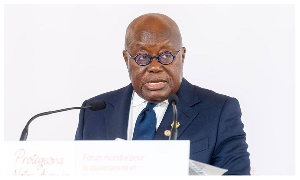Spencer Wan Blog of Wednesday, 29 January 2025
Source: Eric Afatsao
Ghana's Cedi Could Collapse Due to U.S. Deportations, Mussa Dankwah Warns

The potential mass deportation of undocumented migrants in the United States is not just a humanitarian issue—it is an economic one, particularly for Ghana. Mussa Dankwah has laid out a compelling argument on how such an event could trigger a downward spiral in the Ghanaian economy, ultimately leading to a depreciation of the cedi.
He began by highlighting the crucial role remittances play in Ghana’s foreign exchange reserves. “Remittances from Ghanaian illegals will drop, leading to a reduction in our international reserves,” he pointed out. Many undocumented Ghanaians in the U.S. send money back home regularly. If these individuals are deported, their income sources will be cut off, reducing the flow of U.S. dollars into the country. This will negatively impact Ghana’s foreign currency reserves and put pressure on the cedi.
But the impact doesn’t stop there. Mussa explained that a rise in inflation in the U.S. could lead to an adjustment in the Federal Reserve’s policy rate. “Rise in US inflation will trigger Fed Reserve action by adjusting policy rate upward,” he predicted. If this happens, U.S. bond yields will rise, making them more attractive to investors compared to Ghanaian bonds.
This shift in investor confidence could be detrimental to Ghana’s economy. “International investors prefer US bonds to Ghana’s because they are unlikely to receive haircuts. As a result, they might flee our bond market to the US’s,” Mussa explained. Such a capital flight would mean foreign investors exiting Ghana’s bond market, further weakening the cedi as they exchange their cedi-denominated bonds for U.S. dollars.
The depreciation of the cedi is almost inevitable under these circumstances. As demand for the U.S. dollar rises and Ghana’s reserves dwindle, the exchange rate will worsen, leading to inflation. “Cedi depreciation would likely result in increased inflation, throwing out of the window the BoG single-digit inflation target,” Mussa warned. Ghana’s central bank would then have no choice but to raise policy rates in an attempt to control inflation.
However, this comes with its own set of challenges. Higher interest rates would make borrowing more expensive for businesses and individuals, stifling economic growth. “The cost of credit to you and businesses will go up,” he noted, signaling tough times ahead if such a scenario unfolds.
Mussa Dankwah’s insights demonstrate the interconnected nature of global economies. What happens in the U.S. does not stay in the U.S.—it has far-reaching consequences, especially for developing economies like Ghana’s.
source; https://web.facebook.com/share/p/196k8eHkNw/


















